What Is the Appeal of 'Destiny'?
Destiny is one of the biggest new franchises of this generation but what do people love it despite it's flaws?
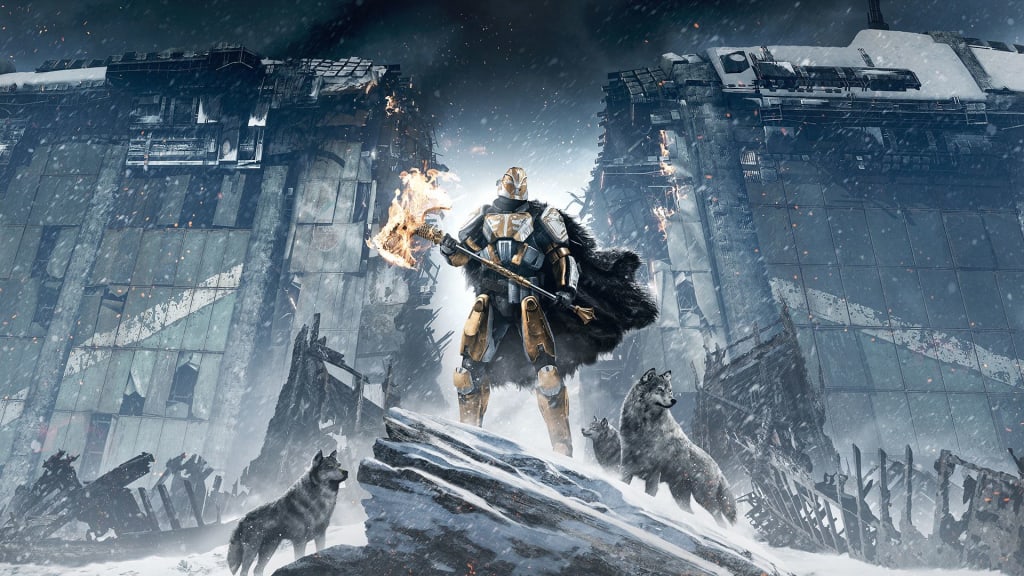
Destiny has become one of the greatest enigmas in the gaming sphere in the past few years. One of the biggest new IP’s to launch during the twilight of the seventh generation and the beginning of the 8th console generation for all intensive purposes, this series should have been dead on arrival considering the considerable critical drubbing it received on release and for good reason.
Fans were promised a rich expansive universe filled with hours of content to explore. A new world from the creators of Halo filled with mystery and wonder, but instead of receiving an ocean of depth what they got amounted to a kiddie pool with a huge amount of repetitive excessively grindy mechanics. But I’m not here to talk about Destiny’s failings there are millions of youtube videos that have already done that to death. What interests me is that despite its numerous mechanical and story-telling short comings, that it’s managed to succeed and spawn it’s own culture. Hell there’s even a convention, guardian con that has been spawned out of Destiny fan culture.
So what is the secret sauce of the series success. How has it found an audience despite its numerous examples of, well, this. Stick around because I’m going to break down what I think the central pillars of success are for Destiny and why the series has seen such success despite its limitations.
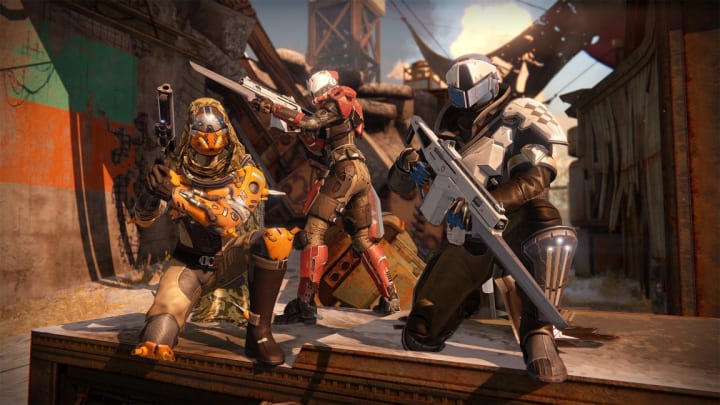
Now on one hand, it’s easy to dismiss Destiny to say it’s just a Halo clone, but to simply use that is to ignore what made Halo special. While in the popular consciousness Halo has become known as the bro shooter of choice. I don’t think that’s the reason why the Master Chief became an icon given how many other space marines have been littered about the gaming landscape. What made the Bungie Halo games work is that they had a profound sense of melancholy. In just about every major game in the series including Halo 1-3, Halo ODST, and Halo: Reach all feature narratives that are tinged with a sense of loss.
You might be Master Chief the indestructible super soldier capable of mowing downs hordes of the covenant, but everyone around is not. Think about the first game. Little by little everyone dies around you. The marines you fight to save and rescue are all consumed by the flood. The stalwart Captain Keyes is assimilated as well and dies horribly despite your best efforts. Even Foe Hammer, the loyal drop ship that’s spent the entire gaming ferrying you around the halo itself is ultimately shot down and demolished.
You might save the universe by stopping the halo, you might have destroyed the covenant fleet, but by the end of the game, humanity is no better off than it was in the beginning still facing extinction from the Covenant. Only now you’re completely alone with no one except your AI companion Cortana. You might have kicked ass and taken names, but everything you did was for nothing.
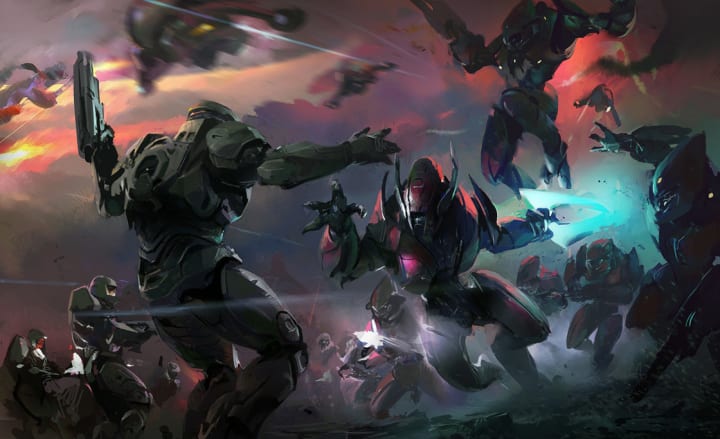
Humanity is still on brink of hopeless ruin from an enemy they can’t hope to compete with. It’s this sense of loss and melancholy that drives the Halo games. For every victory you make in the grander narrative you’re always set two steps back and this is what helped the series stand out from similar fare. It’s what made things feel more poignant than other similar video game power fantasies. Because no matter how well you fight, how many covenant you kill, how many mission objectives you meet you never really win.
It’s not a coincidence that Reach was the final Halo game that bungie made. Despite being the first game where you play in an squad of super powered spartans the entire game’s story has the tone of a funeral dirge, as each of your squad mates is picked off one by one, ultimately leaving you in an abandoned field to fight one final battle that you can never win. Halo’s legacy might have been defined by its multiplayer but what makes it resonant more than something like Doom or Quaker were these somber touches. Even the Master Chief himself is defined by tragedy given the fact that he was essentially kidnapped from his family and forcibly conscripted by a black ops military unit to be indoctrinated into an experimental soldier program that mutilated and killed many of his peers.
It’s something that 343 industries completely fails to understand and why Halo 4 and 5 have not had the same impact as the previous games in the series. They basically treat it like Space Team America: (Play Fuck yeah clip with Halo 5 scene) and without that sense of melancholy Halo just becomes another sci-fi space shooter.
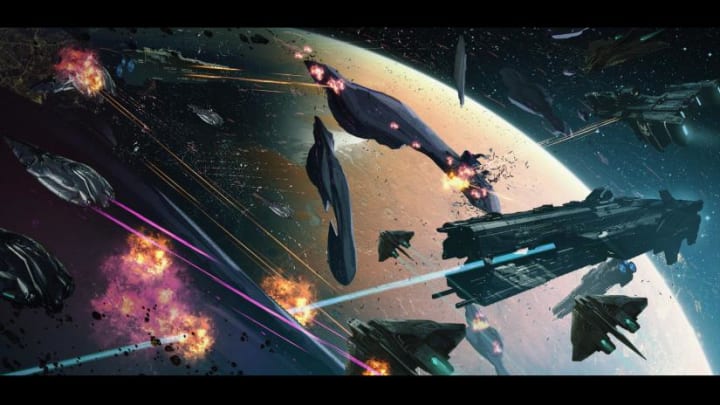
That’s what Bungie completely understands with Destiny. The whole idea behind the game’s lore is that humanity had a great golden age of technology and reached beyond the stars. But all of that was lost. But now as a guardian of the last city, you are responsible for using your sci-fi space magic to defend the last bastion of humanity along with reclaiming the technological glory of the distant past. Destiny’s universe is tinged with a sense of sadness in the sense that it’s post apocalyptic and you can get a sense of that in the art direction and music. But there is also a great sense of wonder inherent in destiny which gets me to my second point in pointing out it’s greater appeal.
Bungie's smartest decision in crafting Destiny was their decision to infuse all of the sci-fi designs seen in Destiny with just a tinge of fantasy. I’d say the ratio is 80/20 ratio in terms of 80 percent is traditional sci-fi fare with spaceships, robots, weird aliens, but sprinkled about is 20 percent fantasy elements that gives Destiny it’s unique flavor. This piece of concept art demonstrates this balance best. You have sci-fi space commandos surveying an alien landscape, but they have capes like they're not just marines, but knights from a distant era. And there’s also that tiger lynx thing which isn’t in the game at all, but it does give the feeling of a classic fable where the hero is accompanied by a magical animal sidekick.
It’s this infusion that makes destiny feel unique even if from a mechanical standpoint it’s not that different from Halo. And this fusion can be seen throughout the game from the space magic powers that all guardians wield to the fact that all of the Vex enemy types are named after classical monsters like goblins, minotaurs, and hydras that provides the game it’s unique hybrid texture of sci-fi fantasy. It’s a rare mix, but there’s one other popular series that manages this balance very well... a little something called Star Wars.
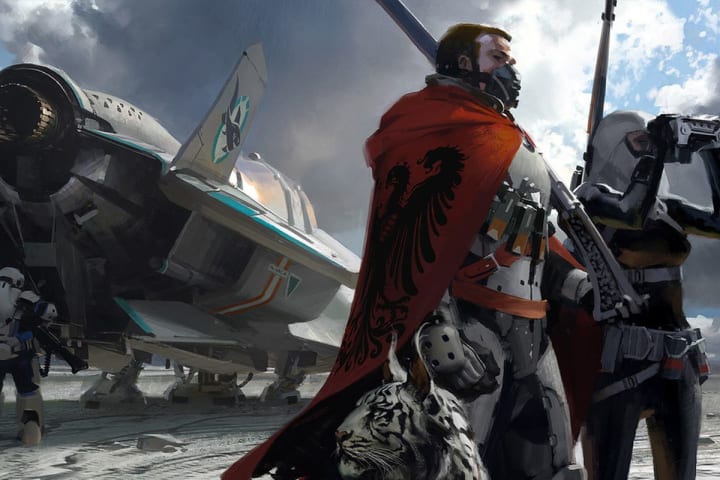
Yeah the force is basically space magic and it’s Star Wars-fusion grounded sci-fi with fantastical fantasy elements that helps it have a broader appeal than something that’s more hard sci-fi like Star Trek. Not to insult Trek, but the reason why Star Wars has had a greater appeal is because of it’s fantasy elements infused with all the staples of classic pulp adventure vs. the typical Star Trek story, which involves older people sitting very seriously in chairs and having ethical dilemmas while they talk to huge video screens. But it’s the element of the force as a supernatural force combined with the lightsaber and the more grounded elements that give Star Wars it’s special flavor.
And it’s something that’s inherently baked into Destiny’s gameplay where most of the time you play it as a traditional sci-fi shooter until your superability is charged up. Then, for a brief moment, the gameplay changes completely where now you’re using a weapon in third person or firing lighting from your fingers. This is even more pronounced when you use one of the melee weapons like the swords that occasionally spawn in the environment. What also helps a great deal is that the environments and enemies all look like they have stories to be told inviting the player’s sense of curiosity. While I’d say the story telling in Destiny generally has a lot lacking I do think what it does manage to do brilliantly is stroke your curiosity and desire to learn more.
And lastly what makes it work is the fact that the core gameplay including shooting and moving is rock solid. Enemies heads pop off with a satisfying poof and mechanically the gun play and weapon feel doesn’t get much better than the tuning done by Bungie.
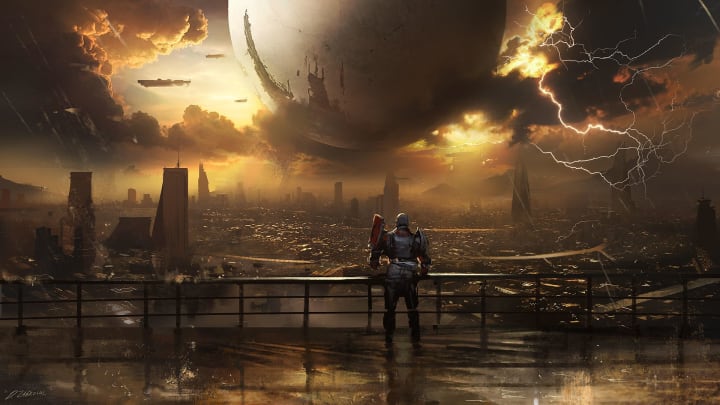
So for me I’m not trying to justify the game’s failings and they are numerous. Bungie sold Destiny as a sprawling adventure filled with tons of gameplay but the reality of both the original Destiny and Destiny 2 was that the game was about as deep and wide as a shallow kiddie pool and when you compare the amount of content released for each expansion to something like World of Warcraft, it becomes painfully obvious that a few missions, one raid, and one strike were never going to cut it.
But I’m not here to discuss the games failings, but rather discuss how it’s managed to succeed in spite of itself. How despite the poor storytelling and a dearth of meaningful content it still managed to build an audience and even a culture around itself. Because I personally believe anything that is widely loved always has some inherent value and rather then dismiss it, it’s always better to try and understand it. And I certainly hope for those of you who feel puzzled by Destiny, for those of you who do like it, but can’t quite articulate why you do that, maybe I’ve uncovered just a little bit in regards of how this series has become an icon of the current generation of gaming.
About the Creator
Isaac Shapiro
When not scrounging the internet for the best content for Jerrick Media, Isaac can be found giving scritches to feathery friend Captain Crunch.



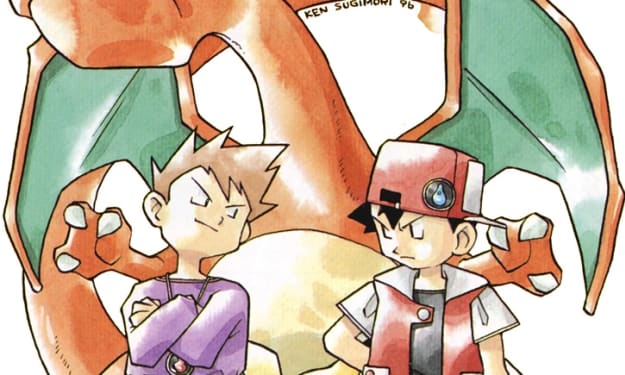


Comments
There are no comments for this story
Be the first to respond and start the conversation.